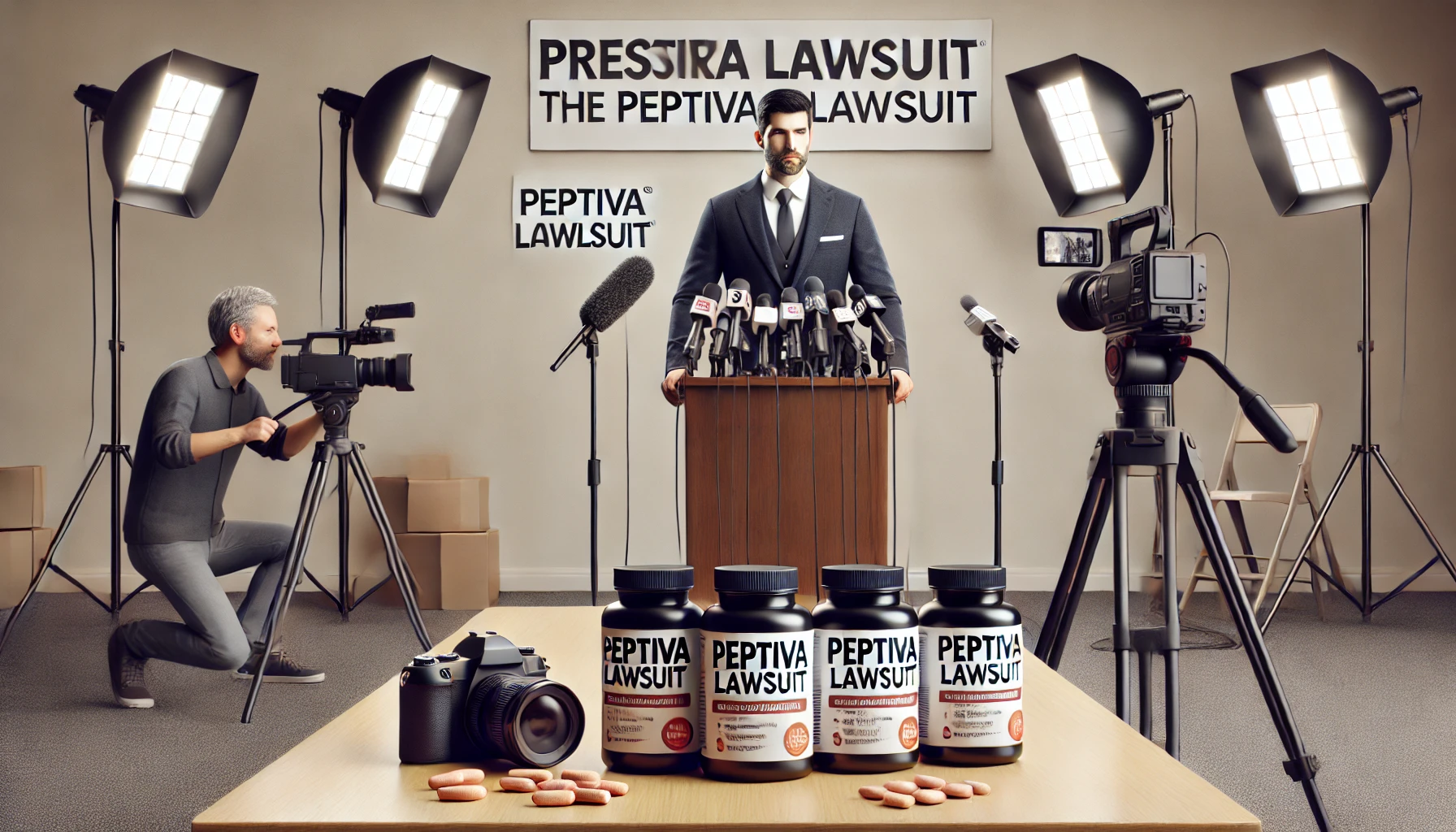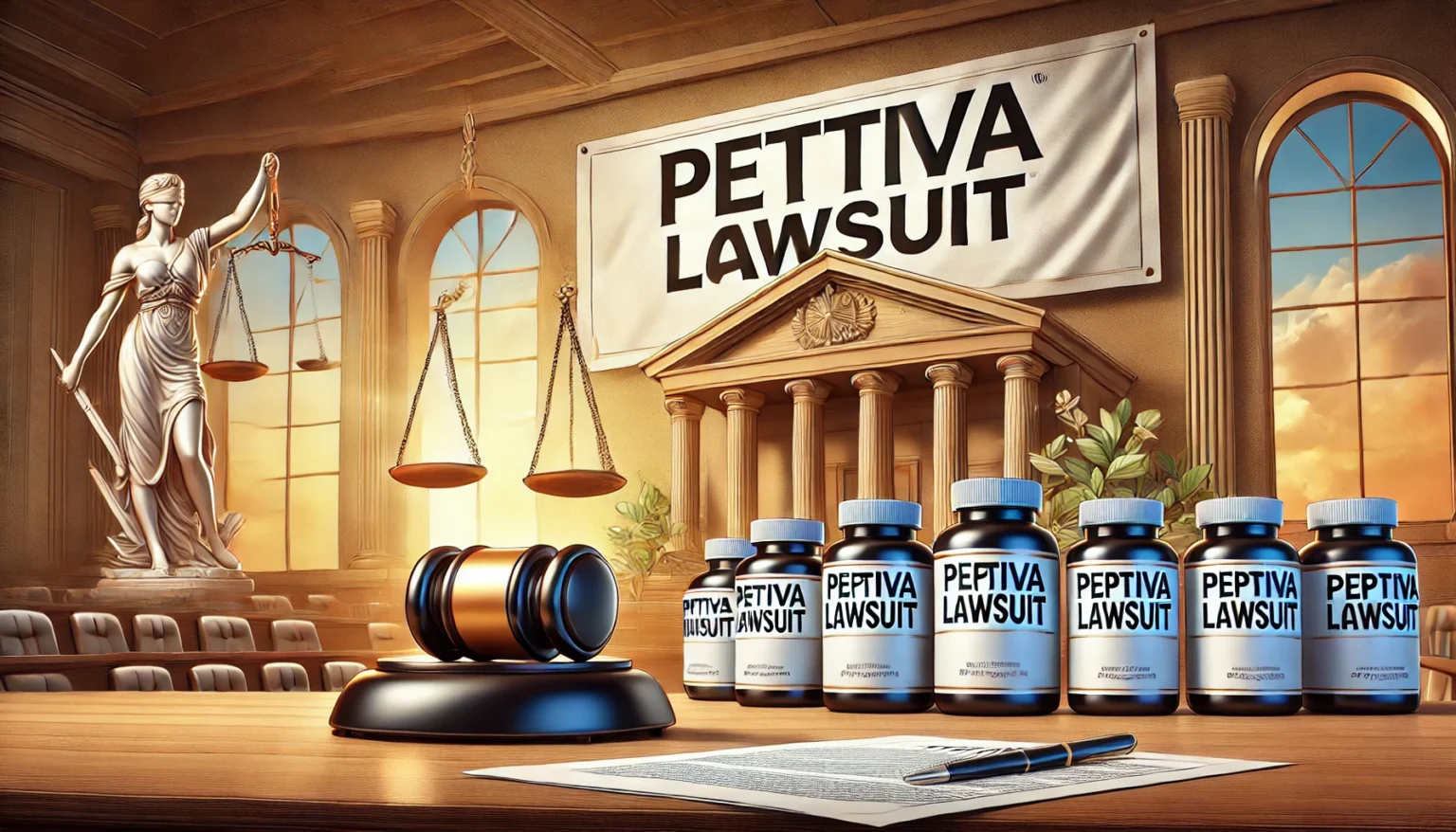The Peptiva lawsuit has garnered significant attention, raising questions about the practices within the supplement industry. This legal case has sparked debates over transparency, product claims, and consumer protection.
At the heart of the Peptiva lawsuit are allegations surrounding the company’s marketing strategies and product efficacy claims. Consumers and regulatory bodies alike are scrutinizing whether the brand adhered to legal and ethical guidelines.
As the Peptiva lawsuit progresses, its implications extend beyond the company itself, shedding light on broader issues in the supplement market. The case serves as a reminder of the importance of accountability in an industry driven by health and wellness promises.
What Sparked the Peptiva Lawsuit?
Consumers claimed that Peptiva made exaggerated claims about its supplements’ effectiveness without providing sufficient scientific evidence to back these assertions.
A significant aspect of the case involves accusations that Peptiva failed to disclose critical information about its ingredients and potential side effects. Transparency in labeling and advertising is a primary focus of the legal action.
Additionally, customers have raised concerns about misleading subscription models. Many reported being enrolled in automatic renewal plans without explicit consent, leading to unexpected charges.
Regulatory agencies also stepped in to investigate whether Peptiva violated industry standards. This increased scrutiny highlights the importance of adherence to rules governing dietary supplements.
This lawsuit underscores the broader need for accountability in the supplement market, emphasizing consumer rights and ethical business practices.
Allegations in the Case Against Peptiva
At the core of the Peptiva lawsuit are claims related to false advertising. The company is accused of making unverified promises about the health benefits of its supplements, such as improved sleep and digestive health.
Consumers allege that Peptiva did not provide adequate scientific evidence to support these health claims. This lack of proof has raised questions about the reliability of the brand’s marketing.
Another major allegation is the use of ambiguous terms in their advertising, leading customers to believe the supplements were clinically proven when such claims may not hold up to scrutiny.
A table summarizing the primary allegations:
| Allegation | Description | Impact on Consumers |
| False Advertising | Unverified claims of health benefits | Misled consumer expectations |
| Automatic Renewals | Lack of clear consent for subscriptions | Unexpected financial charges |
| Transparency Concerns | Insufficient labeling and side effect info | Potential health risks |
These allegations are central to understanding the lawsuit, as they highlight a potential breach of trust between the company and its customers.
Timeline of the Peptiva Lawsuit: Key Milestones
Initial Complaints: The first consumer complaints emerged in early 2023, focusing on misleading advertising and subscription charges.
Class-Action Filing: By mid-2023, a class-action lawsuit was officially filed, consolidating numerous consumer grievances.
Regulatory Investigation: Agencies began their inquiries into Peptiva’s practices, particularly its compliance with industry standards.
Preliminary Hearings: In late 2023, preliminary hearings set the stage for legal arguments from both sides.
Ongoing Developments: As of 2024, the case remains active, with updates expected on potential settlements or trial proceedings.
Each milestone reflects the evolving nature of the case and its growing impact on the supplement industry.
Legal Perspectives on the Peptiva Lawsuit
From a legal standpoint, the Peptiva lawsuit raises critical questions about consumer protection and advertising ethics. Experts argue that the case could set a precedent for how supplement companies market their products.
One focus of the legal debate is whether Peptiva’s claims violated truth-in-advertising laws. These laws are designed to protect consumers from misleading or false statements about a product’s benefits.
The issue of automatic renewals has also drawn attention. Legal experts emphasize the need for clear consent and transparent communication in subscription-based models, which have been a key point of contention in the case.
The case may also explore the boundaries of scientific evidence in health product marketing. Courts will likely examine whether Peptiva provided sufficient proof to support its health benefit claims.
Ultimately, the legal outcomes of the Peptiva lawsuit may influence regulatory policies and consumer trust in the supplement industry.
How Consumers Are Reacting to the Peptiva Controversy
Consumers have expressed mixed reactions to the Peptiva controversy, with many feeling frustrated and misled by the company’s marketing practices. Allegations of deceptive advertising and unclear subscription terms have fueled widespread dissatisfaction.
Social media platforms and online forums are flooded with reviews and complaints from affected customers. Many claim they were drawn in by bold health promises, only to be disappointed by the product’s actual performance.
Some consumers have taken legal action, joining the class-action lawsuit to demand accountability. This shows a shift in consumer behavior, as more individuals become proactive in protecting their rights.
However, there is also a segment of customers who remain supportive of Peptiva, citing positive experiences with the product. These voices highlight the complexity of the situation, as not all users feel they were misled.
This controversy has also sparked broader discussions about the importance of transparency and evidence-based marketing in the supplement industry, making consumers more cautious about similar products.
Industry Impact of the Peptiva Legal Case
The Peptiva lawsuit has sent shockwaves through the supplement industry, highlighting vulnerabilities in marketing and compliance practices. Industry players are now reevaluating their strategies to avoid similar legal challenges.
Many companies fear increased scrutiny from regulatory bodies, as the lawsuit underscores the need for evidence-based claims and transparent business practices. This has led to heightened awareness about adhering to industry standards.
Smaller supplement brands may struggle to meet these rising expectations, potentially leading to consolidation within the market. Established companies with robust compliance measures may gain a competitive advantage.
Table: Key Impacts on the Supplement Industry
| Impact | Description | Affected Stakeholders |
| Stricter Regulations | Increased scrutiny from agencies | All supplement companies |
| Consumer Trust Decline | Hesitation to purchase similar products | Entire supplement market |
| Market Consolidation | Smaller brands facing challenges | Smaller/newer businesses |
The case has also prompted industry leaders to advocate for clearer regulatory guidelines, aiming to restore trust and protect consumers from misleading practices.
Regulatory Issues Highlighted by the Lawsuit
The Peptiva lawsuit has brought regulatory gaps in the supplement industry to the forefront. Central to the case are concerns about compliance with truth-in-advertising laws and accurate product labeling.
A major issue is the lack of robust scientific evidence to support Peptiva’s health claims. This has led to questions about the standards required for supplements to substantiate their advertised benefits.
Automatic renewal practices are another focal point of the case. Regulatory agencies are examining whether Peptiva violated laws governing consumer consent and transparency in subscription models.
The case also sheds light on broader regulatory challenges in the supplement industry. Unlike pharmaceuticals, dietary supplements are not as strictly regulated, creating a gray area for marketing claims.
These revelations could lead to calls for stricter oversight, prompting changes in how regulatory bodies monitor the supplement industry to protect consumer interests.
Potential Outcomes and Resolutions for Peptiva
One likely possibility is a financial settlement to resolve the claims brought by consumers. If Peptiva is found guilty of misleading advertising, the company may face hefty fines and be required to modify its marketing strategies. This could set a precedent for similar cases in the future.
A court ruling could also mandate Peptiva to improve its transparency, particularly in subscription terms and product labeling. This would address consumer concerns about unclear practices.
Some legal experts speculate that the case could lead to stricter regulations across the supplement industry, forcing other brands to reassess their compliance strategies.
Ultimately, the resolution of the Peptiva lawsuit will likely influence not only the company’s future but also the expectations and protections for consumers in the dietary supplement market.
Lessons Learned from the Peptiva Lawsuit
The Peptiva lawsuit highlights critical lessons for businesses in the supplement industry. One of the key takeaways is the importance of transparency in advertising. Companies must ensure their claims are backed by robust scientific evidence to maintain consumer trust.
Another lesson is the necessity of clear and ethical subscription practices. Ambiguous auto-renewal policies, as alleged in this case, not only harm customer relationships but also invite legal scrutiny.
Businesses should also prioritize compliance with industry regulations. The lawsuit underscores the risks of overlooking these standards, which can lead to reputational and financial damage.
Finally, the Peptiva case serves as a reminder of the growing consumer awareness and advocacy in the digital age. Companies must be prepared to adapt to these shifts and prioritize ethical practices.
The Role of Media Coverage in the Peptiva Case
Media coverage has played a pivotal role in shaping public opinion about the Peptiva lawsuit. From news outlets to social media, the case has received significant attention, amplifying its impact.
Investigative journalism has been crucial in bringing allegations to light. Reports highlighting consumer complaints and regulatory concerns have fueled broader discussions about industry standards.
Social media platforms have served as a space for consumers to share their experiences. This user-generated content has added a personal dimension to the narrative, making it more relatable to the public.
However, media coverage has also intensified scrutiny on Peptiva, potentially affecting its reputation and market share. The widespread dissemination of negative information can have long-term consequences for brand perception.
At the same time, the case demonstrates the power of media in holding companies accountable, emphasizing the need for ethical practices in business operations.
Insights into the Supplement Industry Post-Lawsuit
The Peptiva lawsuit has revealed several insights into the dynamics of the supplement industry. A key takeaway is the need for stricter regulatory oversight to ensure product claims are scientifically valid and not misleading.
Consumer skepticism towards supplements has grown as a result of the case. This has pushed companies to adopt more transparent marketing practices to regain trust.
The lawsuit has also highlighted the competitive nature of the market. Companies are now focusing on differentiation through quality and compliance rather than bold, unverified claims.
Bullet Points: Key Post-Lawsuit Insights
- Increased emphasis on transparency in product labeling.
- Growing demand for third-party certifications to validate claims.
- Heightened regulatory scrutiny across the supplement sector.
- Consumer preference for brands with a proven track record of ethical practices.
These shifts suggest a move towards a more accountable and trustworthy industry landscape.
Public Perception of Peptiva Following Legal Challenges
The Peptiva lawsuit has significantly impacted public perception of the brand. Many consumers view the company with skepticism, citing allegations of false advertising and unclear subscription practices.
Negative reviews and discussions online have further tarnished Peptiva’s reputation. Customers who feel misled have been vocal in sharing their experiences, creating a ripple effect on potential buyers.
However, some loyal customers continue to defend the product, highlighting positive experiences. This split in public opinion reflects the complexity of the situation.
Peptiva’s response to the lawsuit will be critical in shaping its future image. Transparent communication and concrete actions to address consumer concerns could help restore trust.
In the long term, rebuilding its reputation will require sustained efforts in compliance, marketing, and customer engagement.
Broader Implications of the Peptiva Lawsuit on Consumer Trust
The Peptiva lawsuit has far-reaching implications for consumer trust in the supplement industry. It has underscored the importance of accountability, as consumers demand greater transparency from brands.
The case has also highlighted the risks of misleading advertising. As awareness grows, consumers are becoming more critical of health claims and seeking evidence-based products.
Regulatory bodies may implement stricter guidelines to protect consumer interests, which could restore confidence in the industry. This could also encourage companies to prioritize ethical practices.
For consumers, the lawsuit serves as a reminder to research products thoroughly before purchasing. The demand for third-party testing and certifications is expected to rise as a result.
Overall, the Peptiva case illustrates the delicate balance between marketing, compliance, and consumer trust, setting the stage for a more informed and vigilant marketplace.
Conclusion
The Peptiva lawsuit serves as a critical case study of the importance of transparency, compliance, and consumer trust within the supplement industry. It highlights the risks companies face when marketing practices and product claims are not adequately substantiated by evidence.
For consumers, this case underscores the need for vigilance when selecting health-related products. The growing demand for transparency and third-party validation reflects a shift towards more informed purchasing decisions in the market.
The broader implications of this lawsuit extend beyond Peptiva, influencing regulatory standards and business practices across the industry. Companies are now more aware of the potential consequences of non-compliance, pushing them to prioritize ethical behavior.




